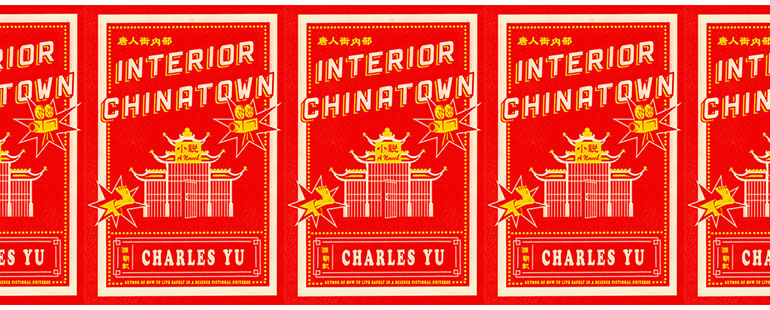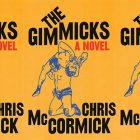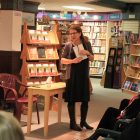“This book feels like engaging in a larger conversation”: An Interview with Charles Yu

Charles Yu is well-known for his thorough and enrapturing world-building. In his 2010 novel How to Live Safely in a Science Fictional Universe, he wields a time machine—the TM-31—with the wry yet heartfelt voice of a different Charles Yu, the novel’s humble time machine mechanic. Yu’s newest release, Interior Chinatown, transports us to a setting that is both our world, the “real world,” and a screenplay, in which protagonist Willis Wu awaits his chance to become more than just “Background Oriental Male.” Interior Chinatown is an inventive look into the world of cinema, where a stable of Asian actors wilts under the bright lights of stereotype and cliché, and where it takes everything we have to become perhaps the very thing that trapped us from the start.
Yu has two other books to his credit: the 2006 short story collection Third Class Superhero is a root source for Yu’s bag of tricks, including a break-up told in equations, motherly doppelgängers, and the walkthrough of a marathon gamer. It was followed by How to Live Safely in a Science Fictional Universe, his debut novel, which follows the mechanic Charles Yu whose life goes awry when he becomes part of a time loop while searching for his father. Most recently came Sorry Please Thank You, a 2012 collection that features a service by which characters can outsource their grief, steps to take in order to troubleshoot your existence, and a beginner’s guide to being human. Eight years later, we are gifted Interior Chinatown, a novel as innovative and witty as his last but with a laser focus on engaging with a large-scale cultural conversation. In Interior Chinatown, Yu is expressly intent on broaching race and ethnicity in the media, adding political and social commentary to his work in a way he hasn’t before.
Written in screenplay format—something familiar to Yu, a TV writer, story editor, and producer—and told in seven acts, Interior Chinatown follows the hopeful career of Willis Wu, whose singular dream is to become “Kung Fu Guy.” Bolstered by a cast that includes his mother (“Pretty Oriental Flower, Asiatic Seductress,” etc.), his father (“Twin Dragon, Wizened Chinaman,” etc.), and Older Brother (who is “Not your actual older brother. Better. Everyone’s Older Brother”), Yu explores Willis’ journey to work his way up from “Generic Asian Man” on the woefully popular detective show Black and White.
Beginning in the workaday life of Generic Asian Man and wending his way to “Special Guest Star,” Willis attempts to puncture stereotypes and beat a system in which he is simultaneously implicated, carrying us through memories of his mother’s recurring roles, his father’s once upward trajectory, and Older Brother’s stardom, all within the confines of “INT. CHINATOWN SRO,” a compact and poverty-stricken locale home to seemingly every capable, though grossly underused, Asian player. But even as Willis makes his way up this short ladder of possibilities and on to Mini Bosses and Henchmen, he cannot break the shackles put upon him by racial expectations. Although Willis does manage to start growing into himself, finding love and even becoming a father, the Kung Fu Guy moniker still proves too great a temptation to relinquish. Desperate and foolhardy in his quest, a breach of studio etiquette blurs into crime, and we find Willis on trial, against himself.
Yu is a master at mixing the artful, the humorous, and the meaningful atop new landscapes, and Interior Chinatown is no exception. The novel dips in and out of Willis’ media life and his real one, but because the book is written in a screenplay format, with character run-downs, dialogue, and calls for “INT. GOLDEN PALACE,” the line between the two playfully and poignantly blends: “And then you understand. It’s the bridge into the next scene, how Black and White works, the plot humming along from clue to clue. You’re just along for the ride, part of the story now.” As he did with the notion of time machines and loops in How to Live Safely in a Science Fictional Universe, Yu takes Hollywood fodder, presses it into a wholly fresh substance, and tosses it back to us. What results is a deeply satisfying take on racism, the film industry, and the roles we fulfill, or wish we could fulfill, in our own lives.
I recently spoke with Yu about the intention behind using the screenplay format, the throat-clearing moment of entering this racial conversation, the effect children have on writing, and the comfort he finds in looping or cyclical literary elements.
J.A. Tyler: You have a big connection with TV and film. You’re a former story editor with HBO’s Westworld and you’ve written for other TV shows. Was it always your intention to write Interior Chinatown in a teleplay or screenplay format?
Charles Yu: Yes and no—I guess the short answer is that when I came up with the first line of the current version of the book [“Ever since you were a boy, you’ve dreamt of being Kung Fu Guy”], it naturally progressed into Am I going to do this as a show? I think I kind of have to do it as a show, including the format. I did write this book a couple of times depending on how you count it, and I threw away large chunks of earlier versions that just weren’t working. And those don’t exist anymore, those are just part of the process of writing.
JAT: In this format, there are pages where I think, Wait a second, is this in the TV world or in an actual world? The novel smears those two things together. Is that part of what made you want to write it this way?
CY: Yes, you put your finger exactly right on it. The smearing both was the biggest challenge in writing it and also what ended up being necessary to it, that the two levels conflate. If I had to switch back and forth between chunks of prose that looked like a traditional novel and the screenplay format, I think that wouldn’t have worked as well as one continuous screenplay.
JAT: So in earlier versions, did it have portions that were not written in a screenplay format?
CY: In the earlier versions, it was almost a completely different book. I had other titles for it, and some of the same passages have survived, but it was not this iteration. When I came up with the current first line of the book, that’s really what started the ball rolling down the hill, because I found my entry point. I would say I wrestled with it for a few days, trying to say Am I really going to do a whole book in this format? Then I committed to it, because it felt necessary. I play a little loose with the format at times, but it still holds together as a very strange looking screenplay.
JAT: Was that first line the smallest kernel of the novel, before it was anything else?
CY: It was. It told me something about the framework and the worlds and the character, all of it, and I thought Okay, I think I can start from there.
JAT: In a 2018 interview with Sonora Review, you spoke about how in this project you were going to intentionally write about race and ethnicity. Did that change how you worked on the novel?
CY: It was a little bit scary. This book is a bit of a departure maybe, but I’m thinking about it more like my writing is evolving and this is actually the next step. It’s not so much that I’ve gone away from science fiction or speculative writing—I certainly think there’s some commonalities in there, and it still plays with form in ways that I’ve done before. But still, I had never been so explicit about it, both with myself and when I was talking with my editor and agent as well, that I’m going to try to engage with some of these issues that I’ve never talked about in my fiction. I think psychologically that was a little bit tricky for me too, like Oh, now I have to say something important and I’m not sure—I don’t know if I have that register in my voice.
JAT: How about now, at the moment of publication—is it scary?
CY: Yes, you have just triggered my anxiety with that! I’m certainly encouraged by early responses, and on some level, it won’t matter if someone says No, this isn’t what you thought it was going to be, you didn’t hit the mark, because the work was the realized version of what I wanted to say, for better or worse, and hopefully better. But yes, there’s anxiety about it. It’s one thing to write a highly personal story about a father and son and a time machine or about a low-tech sci-fi world. This book feels like engaging in a larger conversation in a way that’s a little bit scary, because I don’t know if people want me in that conversation, and I’m clearing my throat and announcing that I’ve joined the conversation.
JAT: In terms of that, how much research did you do for this novel?
CY: More than any other thing I’ve written. I read a few books and I did some legal research which was weird, because I was a lawyer for a long time. I wasn’t this kind of lawyer, I wasn’t a constitutional law or civil rights lawyer. I was a corporate lawyer at first, then I became an in-house contracts lawyer for technology companies. But I did as much research as I felt was necessary for the story. I didn’t set out to necessarily tell a very deep legal story or a very deep story about the cultural roots of Chinatown. But I did want the flavor, and I wanted the specifics about what happened both with the construction of Chinatown, for instance, or with these legal cases in which the rights of Asian Americans specifically were denied at first, then a slow progression toward having those rights. Those things all actually ended up dovetailing with the story in ways that almost felt too good to be true at times. I felt like, Oh, either I did this by accident, or I scored something from osmosis, that this story was lining up with things that really happened. So that was a happy sort of discovery.
JAT: Are there portions of the research you were tempted to put in but maybe pulled back from because you didn’t want it to become a different type of a novel?
CY: There were more legal cases and tidbits [and] I would have loved to just type a bunch of them in and have them in a book and say Look, can you believe this was true, or that? Mostly in the vein of what’s already in there, so it’s not like I cut out things completely. Especially because some of the things I was reading about were about exclusion, about who gets to be an American, literally, who gets to be considered that, what rights, privileges, and status does that accord you, and how that, when I was writing in 2017 and 2018 mostly, how that was still incredibly relevant. That was shocking and little bit upsetting to realize, Oh, we’re seeing this again, not with the same groups necessarily, but we’re seeing it.
JAT: And yet, there are so many places in the book where I laughed out loud.
CY: I’m glad to hear you laughed! My goal is always to never take myself too seriously. I get myself in trouble very quickly if I think I’m writing something that’s important, so I’m hoping it’s also a fun read.
JAT: Switching gears a bit, you have children, and I think the influence of children on authors is unique and powerful. Willis talks in the novel about how children are “perfectly weird weirdos.” How much do your kids influence your writing?
CY: A lot. Yes. I almost don’t really remember what it was like before I had kids. They’re not that old, but I’ve been writing 18 years now and I’ve had kids for two-thirds of that and so I think in a lot of ways they really shape my voice and also the kinds of things I think about. They are an incredible source for silliness but also, I don’t want to say profound things, but there’s a sense in which they’ll say things that make me really fascinated by the way their minds work, the way their minds are engaging the world and connecting to information. How they don’t have all the preconceptions and scar tissue that I have, that I bring to how I think about things. But on a very fundamental level, the emotional interaction, the relationship I have with my kids, it feels like an ongoing dialogue that really feeds me and feeds my work.
JAT: In your previous novel, looping was obviously a staple, but Interior Chinatown also loops back on itself and has reoccurrences. What is it that you find satisfying or comforting about the notion of recurrence or the cyclical nature of things that keeps you writing about them, albeit in different ways?
CY: That’s a really interesting connection. There is a cyclical nature to Willis’ existence. He’s almost been kind of trapped in a loop. I think for better or worse, I’m a bit of an “unstuck in time guy.” I love Slaughterhouse Five. It’s one of my favorite books. The freedom that device affords you in fiction is valuable as a storyteller and, as a person, I think I’m the kind of guy who likes being in the moment. I try to be better about being in the moment, but I’m just a mental time traveler, and I can’t help it.



